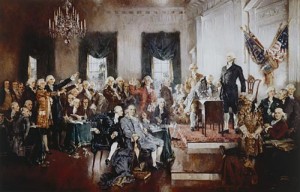NOVANEWS
Exclusive: A referendum like Brexit can be a satisfying moment for an angry populace to vent its frustrations but “yes or no” answers to complex questions can be dangerous for democracy, explains Daniel Lazare.
By Daniel Lazare
There’s a theory going around that referenda are the ultimate in direct democracy. There’s something about masses of people voting for or against some major issue that causes would-be populists to go weak in the knees. But the theory is pure myth, as the Brexit debacle shows. Rather than raising democracy to a new level, referenda often drag it down.
The classic example occurred in the early 1850s when Napoleon III, nephew of the more famous Napoleon I, engineered back-to-back plebiscites that allowed him to institute a dictatorship for nearly 20 years. Instead of democracy, France got the opposite – political prisoners by the thousands, foreign adventures, and a disastrous war with Germany.
More recently, there is California’s system of “initiative and referendum” that was supposed to usher in a glorious age of progress back in 1911, but has instead allowed an endless parade of conservative business interests to manipulate state politics and bend them to their will.
There’s also a long-forgotten 1973 referendum on Northern Irish independence that, as the LondonIndependent’s estimable Patrick Cockburn recently pointed out, “did nothing except exacerbate hatred and convince the losing side that they had no alternative except violence.”
There’s also the 2005 U.S.-engineered constitutional referendum in Iraq that, according to Cockburn, “turned out to be one more stepping stone towards civil war.”
There’s last June’s farcical Greek referendum on the European Commission’s budget bailout proposals in which a resounding 61-39 no vote somehow provided the Syriza government with a mandate to say yes to everything the E.C. demanded.
And now there’s Brexit in which a 52-48 vote in favor of leaving the European Union has left the United Kingdom’s political classes feeling dazed and confused. Scotland, which voted heavily in favor of staying put inside the U.K. in 2014, is once again pushing for independence as a consequence of Brexit, while Sinn Fein, which is also pro-E.U., is calling on Northern Ireland to leave the U.K. and join up with the republic to the south (possible consequences unanticipated by many Brexit supporters).
Ultra-rightists are, meanwhile, pushing for similar leave-the-E.U. referenda in Denmark, the Netherlands, Italy, Slovakia and Poland, suggesting that the great E.U. sundering may have only just begun. It’s a massive snafu that has apparently left many “leave” supporters with a serious case of buyer’s remorse.
Democratic Breakdown
But how did this happen? Brexit is a milestone in an ongoing process of democratic breakdown taking place on both sides of the Atlantic. Britain has all the symptoms of the disease in its final stages, not just advanced income polarization and a runaway financial sector, but a privileged political class that is increasingly detached from the masses below and a Parliament that is increasingly unrepresentative.
Fifty or 60 years ago, for example, 90 percent or more of the British electorate voted either Conservative or Labour. The percentage has fallen to just 67.3 percent as of last year thanks to the rise of smaller parties like the Scottish National Party and the Liberal Democrats, but the duopoly still winds up with 85 percent of the seats.
Even though Conservative Prime Minister David Cameron commands a solid parliamentary majority, he heads up what was in fact a minority government backed by just 36 percent of the electorate. Conversely, the upstart U.K. Independence Party took home 13 percent of the vote in 2015, yet wound up with just one seat out of 650. If Cameron was weaker than he appeared, UKIP was stronger.
For those who despise UKIP and the right-wing xenophobia it stands for, this was a result they could live with. But it was unsustainable. Desperate to keep UKIP out and thereby preserve his own parliamentary majority, Cameron made his pact with the devil by agreeing to hold a referendum on the subject of the E.U.
Out of touch with popular opinion, the Prime Minister figured that he could have his cake and eat it too by portraying himself as a down-home populist while resting secure in the belief that the status quo would prevail.
Needless to say, he miscalculated. By shutting UKIP out, he provided it with an extra-parliamentary field from which to mount an assault on Westminster’s two-party dictatorship. The offensive succeeded beyond all expectations, resulting in one of the most stunning political upsets in the U.K.’s post-World War II history.
Now consider what might have happened had Parliament been more representative. With not just 13 percent of the vote but 13 percent of the seats, UKIP might well have succeeded in maneuvering the Conservatives, with their large Euro-skeptic wing, into adopting an explicit anti-E.U. stance. But even if UKIP had prevailed, chances are it would not have done so for long.
Parliament would have been forced to thrash the issue out in full, and if it still voted to leave, it would always have the option of reversing itself at some later date. Once the battle had been fought, the Remain camp might eventually have emerged all the stronger by virtue of its long march through the trenches.
Addressing Reform
But this would have required thoroughgoing constitutional reform aimed at rendering Parliament more equitable. Constitutional reform was once a hot topic in Britain, but it suffered a long and lingering death under Labour Prime Minister Tony Blair. Instead of wrestling with the problem democratically, Cameron opted for a pseudo-democratic referendum.

British Prime Minister Tony Blair and U.S. President George W. Bush shake hands after a joint White House press conference on Nov. 12, 2004. (White House photo)
He thought it was an easy way out since the vote was sure to go his way. Now that it hasn’t, politicians are searching desperately for a solution. But short of a miracle, one is unlikely to be found.
None of this is to say that Brexit is incorrect. With the E.U. turning into an iron cage of neoliberalism and bureaucracy, powerful arguments can be made both pro or con. But a referendum is a disaster because it leaves the British people with no obvious recourse.
If the decision turns out to be wrong, then, short of a revolutionary transformation of British politics, it deprives the people of the ability to correct their own error. It robs the people of their own sovereignty, presuming such a thing can be said to exist in Britain’s antiquated constitutional system.
Oh those silly Brits with their bewigged judges and outmoded monarchy! Aren’t Americans lucky that they’re so much more up to date?
But American are not. Take Britain’s sclerotic political institutions and multiply them by a hundred and you may begin to get an idea of how politics have fallen in the two-century-old oligarchical republic known as the United States.
Where to begin? There’s a Senate that is perhaps the most unrepresentative major legislative body on earth, one that grants equal representation to lily-white Wyoming and to multi-racial California even though the latter’s population is some 67 times greater. There’s a House of Representatives that, thanks to the miracle of gerrymandering, has come under a semi-permanent Republican dictatorship.
There’s an Electoral College that not only exaggerates the clout of Wyoming, Montana, and other under-populated Western states but forces presidential candidates to concentrate on winning over half a dozen swing states while ignoring the rest. There’s gridlock that now extends not just to Congress but to the Supreme Court. And there’s a political class that is far more detached and corrupt than anything poor little Britain has to offer.
Founding Flaws
These are all products of structural errors that the supposedly infallible Founding Fathers put in place. It’s not necessarily their fault. After all, they were practical politicians wrestling with problems that were all but overwhelming. But the one of the worst things they did was to create an amending clause in Article V that requires approval by two-thirds of each house plus three-fourths of the states to change so much as a comma.
Again, it wasn’t necessarily their fault since a tight restriction on constitutional change was necessary to seal the package and see it through to ratification. (An obvious exception was the so-called “Bill of Rights,” the first ten amendments that were demanded by some critics of the Constitution and were promptly ratified.)
But more than two centuries later, the amendment process is a disaster. Whereas the three-fourths rule allowed four states accounting for as little as ten percent of the population to block any constitutional amendment in 1790, today it grants total veto power to just 13 states accounting for as little as 4.4 percent.
Given today’s partisanship and the quasi-mystical view of the Constitution as some sort of divine document, the barriers to change are all but insurmountable. This is why – not counting the 27th Amendment regarding changes to compensation of members of Congress, which was written in 1788 but not ratified until 1992 – there have been no constitutional amendments since 1971, a 45-year constitutional dry spell exceeded only by the dry spell that preceded the Civil War (another time of bitter political infighting – over slavery and the balance of power between the federal government and the states).
In today’s political environment, the three-fourths rule locks in the Founders’ errors and makes the simplest correction impossible. Take the Second Amendment, 27 words dating from 1791 that everyone claims to understand but which are in fact indecipherable.
If no one knows for certain what a “well-regulated militia” means, what it has to do with “the right to bear arms,” or even whether “bear arms” means a personal right to carry a gun or was meant by the authors to state the right of citizens to participate in a militia, then the obvious answer is to issue a clarification.
That’s what happens when a journalist turns in copy that is muddled and unclear or when a government agency issues a regulation that doesn’t make sense. But since no one would have any problem coming up with a list of 13 rural states unalterably opposed to tampering with what they regard as holy writ, it’s impossible.
Dante’s Inferno
So, like characters in Dante’s Inferno, Americans are condemned to argue for all eternity about a problem that no one can fix. The same goes for the institutional structures of the Senate, the House, the Supreme Court, and the Electoral College.
Given Article V’s powerful bias in favor of the status quo and today’s political dysfunction: all are unfixable as well. Americans have done to themselves what the British have done with Brexit. They’ve locked in their own impotence not once, but many times over.
This is why the Yanks are even angrier nowadays than the Brits. Their leaders remind them nonstop that they are the most powerful people who have ever lived, that their country is the greatest on earth, that they are the envy of the world, blah blah blah. Yet democracy is squelched, government is at a standstill, the economy is turning sour, and conditions for a growing portion of the population are plunging downhill.
Yet there seems to be nothing the people can do about the problems because the Founders failed to provide adequate tools. So they sit and steam and then vote for a latter-day Napoleon III who bills himself as an anti-politician who will knock sense into the system from outside.
Though many political experts tell us that Donald Trump can’t win no matter how angry the American electorate seems to be, the experts also dismissed the chances of Brexit prevailing in the U.K.







